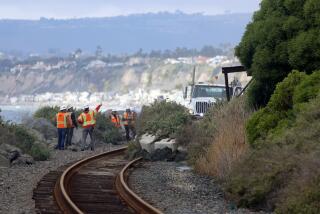Amtrak Halts Express Trains Again as More Cracks Are Found
- Share via
WASHINGTON — Amtrak’s optimistic timetable for restoring Acela Express service broke down Thursday when additional cracks were found on the undersides of locomotives that power the high-speed trains.
For the second time this week, Amtrak canceled all Acela Express runs and tried to plug the scheduling gaps by putting more conventional trains into service.
Adding to Amtrak’s struggles, inspectors for the first time found cracks in shock-absorbing assemblies underneath a locomotive other than the ones that pull Acela Express trains, which operate only between Washington, New York and Boston.
That locomotive and 14 others like it were built under the same contract, and by the same manufacturers, as the 18 Acela Express trains; they also serve the Northeastern corridor. Amtrak quickly pulled the conventional locomotives from service, exacerbating its equipment squeeze.
Amtrak scrambled to find replacement gear and even leased some locomotives and coach cars from commuter agencies in Pennsylvania, New Jersey and Maryland. It planned to offer 115 departures in the Northeast today, compared with the typical 140.
Amtrak spokesman Cliff Black said the conventional locomotives have shock-absorbing “yaw damper” assemblies that are virtually identical to those underneath Acela Express locomotives.
All the cracks and breaks have involved brackets that connect the yaw dampers to the train. A yaw damper assembly that fell off a moving train could damage its underside or possibly derail it or another train.
Bombardier of North America, which built the trains along with France’s Alstom Ltd., sent Amtrak 40 replacement brackets that are slightly thicker than the ones initially installed on the trains.
Carol Sharpe, a spokeswoman for Bombardier, said the company proposed a temporary fix under which the new brackets will be applied to two of the Acela Express trains while repairs are made to existing brackets on the others.
Stan Bagley, Amtrak’s chief operating officer, said that some Acela Express service could return next week, with full service resuming the following week, but only if the temporary fix proceeds as hoped. “My customers and my employees are being inconvenienced by this, so naturally I want to see everything back as quickly as we can,” he said. “At the same time, I want [workers] not to rush, and I want them to use good judgment.”
The Acela Express service, a pricey but popular alternative for business and leisure travelers in the Northeast, was suspended Tuesday after inspectors first discovered cracks and breaks in the yaw damper assemblies that keep locomotives from swaying at high speeds.
Two trains that passed inspection returned to service Wednesday, and Amtrak hoped to add three more on Thursday.
But a more rigorous inspection of one of those three trains early Thursday prompted Amtrak officials to suspend all service once again. Inspectors “found cracks that had not been previously detected,” Amtrak spokesman Bill Schulz said.
Shares in Alstom took a pounding Thursday on the Paris stock exchange amid the mounting concerns about the trains the company has supplied to the United States.
The bullet-nosed trains can travel at speeds up to 150 mph. Until this week, Amtrak typically sent 15 of the trains into duty each day.
About 10,000 people ride Acela Express trains on a typical weekday.
The high-speed trains entered service in November 2000, after more than a year of delays. Cracks first appeared near the yaw-dampening assemblies during testing of the trains, said Rob Gould, a spokesman for the Federal Railroad Administration, but those were attributed to bolts that were too tight.
Gould said the railway agency determined that the issue was not a significant safety risk but required Amtrak to perform rigorous inspections of the trains once they entered service.
“We’ve been in constant contact with Amtrak” this week, Gould said. “Our end game is to make sure whatever fix they come up with is safe.”
More to Read
Sign up for Essential California
The most important California stories and recommendations in your inbox every morning.
You may occasionally receive promotional content from the Los Angeles Times.













